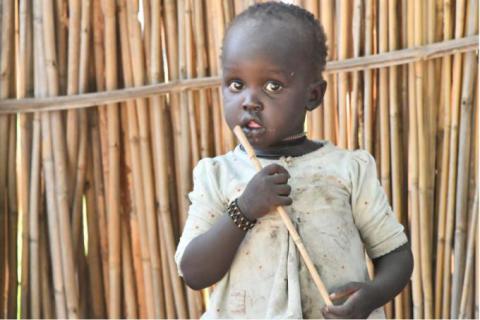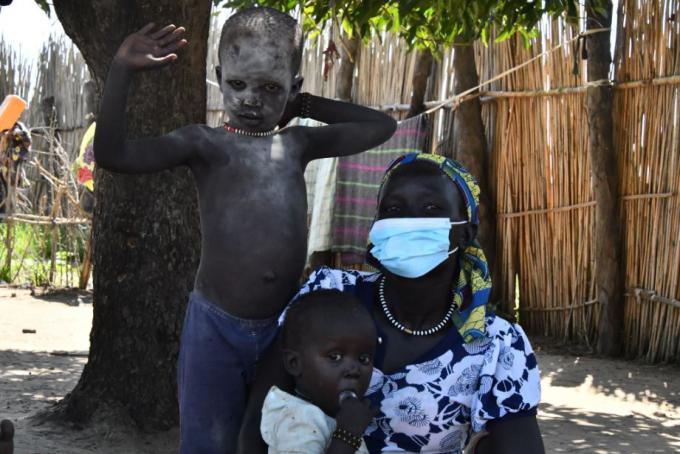Saving lives through Community-based Management of Acute Malnutrition
Adut* (1.5) who recovered from malnutrition lives with her mother Jane* (39) and five siblings in Bor, a large town in South Sudan hard hit by conflict, floods and inter-communal fighting. Her father works outside the town and only visits a few times a year.
Photo: Tito Justin/Save the Children
Bor, South Sudan - Adut and her family were displaced by conflict and where she lives now, life is still hard because her mother Jane can’t cultivate her own food due to recent flooding. Jane is the only bread winner in the family.
Adut was born prematurely and has long had health complications. She has also experienced malnutrition and sicknesses like diarrhea due to poor nutrition and unsanitary living conditions.
In 2020, Jane joined Save the Children’s Mother to Mother support group where she was trained on how to take care of her children including breastfeeding and dietary/meal preparation for her children. Save the Children also support Jane’s family with basic needs, such as relief food, hygiene kits, etc. to take care of her children.
With the training on breastfeeding and cooking demonstration, Jane said, she is able to take care of her children especially Adut. “All of them are now health even the one born before 9 months is healthy and I am still breastfeeding her up to two years or beyond.”, said Jane.
Save the Children trained Adut’s mother Jane on breast feeding and initiation of earlier breast feeding. That helps them to monitor malnutrition among the children at community level. Save the Children trained Jane on cooking demonstration to boost dietary diversity and minimum meal frequency. To maintain hygiene at home, Save the Children also provided hygiene kits to Adut’s family.
Jane’s story in her own words (Quotes):
Jane her two children, Adut*, 1.5, and Francis, 3 at home in Bor, South Sudan. Photo: Tito Justin/Save the Children
“I live in Bor and I have six children. At first, I was displaced by floods and conflict and walked for 3 hours with my children to find a new are of settlement here”
“I stay alone here and I am the bread winner of the family. My husband doesn’t stay here even the money they give him cannot buy for us food”
“My farmland has recently been flooded, which created a challenge for me to get food for the family. Even where I stay now, we don’t have good health facilities. Every time my children are sick, I walk for about 8 hours (to and from) to look for good health”
“Only my elder daughter who is 14 years is in school and since then because of the Coronavirus, all the children are at home without school”
“The food we eat here, during wet/rainy season, we have greens and during dry season, we harvest sorghum and that is our main source of food. If there’s food, I cook twice a day for my children but if there is no food, we only have a meal and sometimes go without proper feeding”
“My last born is one year and six months. I was worried about my younger child since we’re displaced to this place. In April 2021, I joined Save the Children when they can with a group in this area”
“Here we learned about breast feeding and how to feed children and how to keep them clean. They teach us how to cook food.
“I delivered my last child premature about 8 months’ pregnancy. With the teachings I got, I was able to feed and treat my last born well and she’s even more healthy that the rest of the children. My daughter is not 1.5 years but I am still breastfeeding her. I used to stop the children from breastfeeding even before reaching one year. This was not a normal practice for us here but now is helping us a lot”
“We thank Save the Children. What we need now is farm inputs such as hand hoes and seeds so that we cultivate our own foods. We also want health centre because now, it takes us about 8 hours walk to get health facility”
Save the Children Nutrition intervention in Jonglei State helps to prevent mortality from acute malnutrition through short term interventions such as Community-based Management of Acute Malnutrition (CMAM) by strengthening the mass screening and management of acute malnutrition cases. We will also use community-based social and behaviour change communication on improved nutrition and caring practices. Providing livelihood assistance to households will help them in meeting lifesaving needs from malnutrition and hunger in the immediate and short term. The project targets 52,183 (27,963 children) beneficiaries.
*Names changed to protect identities.
Written: Tito Justin/Save the Children
 South Sudan
South Sudan 
